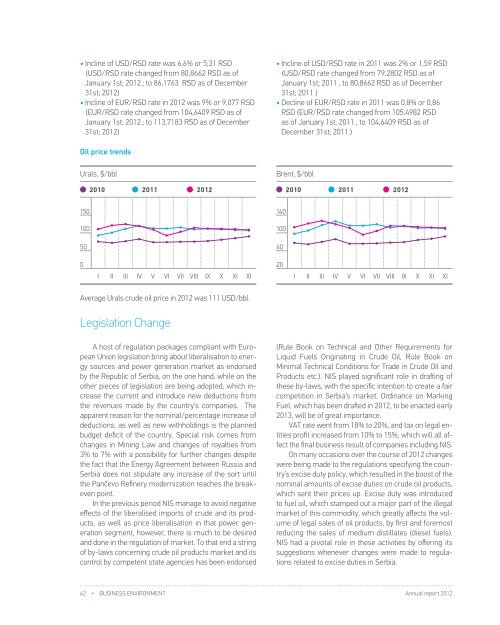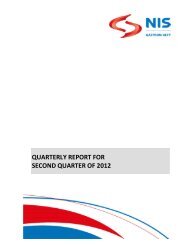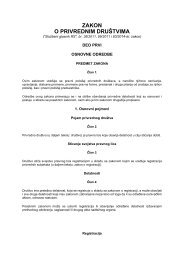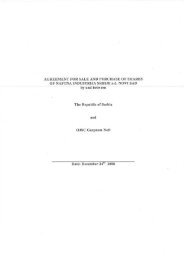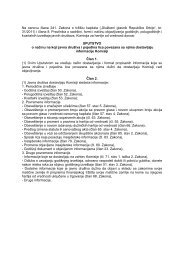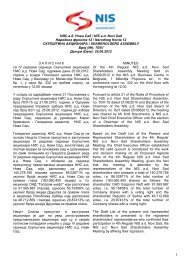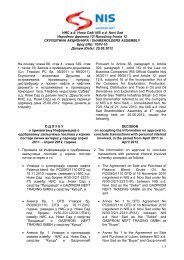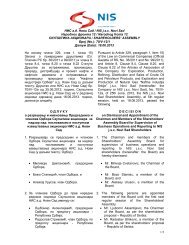FY 2012 - Investor Relations - NIS
FY 2012 - Investor Relations - NIS
FY 2012 - Investor Relations - NIS
You also want an ePaper? Increase the reach of your titles
YUMPU automatically turns print PDFs into web optimized ePapers that Google loves.
• Incline of USD/RSD rate was 6,6% or 5,31 RSD(USD/RSD rate changed from 80,8662 RSD as ofJanuary 1st; <strong>2012</strong>.; to 86,1763 RSD as of December31st; <strong>2012</strong>)• Incline of EUR/RSD rate in <strong>2012</strong> was 9% or 9,077 RSD(EUR/RSD rate changed from 104,6409 RSD as ofJanuary 1st; <strong>2012</strong>.; to 113,7183 RSD as of December31st; <strong>2012</strong>)Oil price trendsUrals, $/bbl• Incline of USD/RSD rate in 2011 was 2% or 1,59 RSD(USD/RSD rate changed from 79,2802 RSD as ofJanuary 1st; 2011 , to 80,8662 RSD as of December31st; 2011 )• Decline of EUR/RSD rate in 2011 was 0,8% or 0,86RSD (EUR/RSD rate changed from 105,4982 RSDas of January 1st; 2011 , to 104,6409 RSD as ofDecember 31st; 2011.)2010 2011 <strong>2012</strong> 20102011<strong>2012</strong>150 140100 10050 600 20I II III IV V VI VII VIII IX X XI XIBrent, $/bblIIIIIIIVVVIVIIVIIIIXXXIXIBased on the provisions of Power Generation Legislationa dozen by-laws were passed, which are of greatimportance for the operation of our Block Energy, whichdeveloped a methodology for pricing the access to networksfor transport of electricity and natural gas. Thismethodology, in turn, shall produce respective rules tobe adopted by state agencies in exclusive charge of this(system operators). Block Energy has long benefited fromPower Generation Law, including the investments into renewableenergy, being a pivotal objective of respective EUDirectives.In the second half of <strong>2012</strong>, when there was an anticipationof a host of by-laws related to the current Law onMining and Geological Exploration, Mining Ministry issueda new Draft Law on Geological Exploration and Mining,which regulates our core activities altogether differently.However, the area to be regulated by these by-laws remainedunregulated due to the anticipation of the endorsementof a new Law. By participating in the process of creationof new Law <strong>NIS</strong> significantly improved the existingrevisions of this important regulation. Together with thisnew Law it is expected that the Republic of Serbia will endorseMineral Resources Management Strategy by 2030.Furthermore, some other pieces of legislation are beingdrafted, and they will significantly affect <strong>NIS</strong> businessoperation (Law on Compensation for Utilisation of PublicGoods, Law on Republican Government Reserves, Law onEmergencies, and Law on Energy Efficiency...).<strong>NIS</strong> shall invariably strive to make its unceasing contributionto the creation of business environment in Serbia.The changed business environment, mainly due to theexpected increase of deductions from income, shall invariablyaffect the potential <strong>NIS</strong> profitability, which in turn,shall affect the quotation of <strong>NIS</strong> shares at Belgrade StockExchange in 2013, when these laws will be fully endorsed.By taking an active part in drafting legislation, as well as byundertaking various other development activities <strong>NIS</strong> willstrive to cushion the effects of such trends, while maintainingits good business results. It goes without saying thatall these activities are related to further implementation ofcapital investment projects similar to the modernisation ofthe Petrochemical Plant in the city of Pančevo, constructionof Base Oils Production Plant III in Novi Sad, constructionof a number of electricity generating plant by BlockEnergy, as well as oil and gas project in the country andabroad (Romania, Hungary, Bosnia-Herzegovina etc.)Average Urals crude oil price in <strong>2012</strong> was 111 USD/bbl.Legislation ChangeA host of regulation packages compliant with EuropeanUnion legislation bring about liberalisation to energysources and power generation market as endorsedby the Republic of Serbia, on the one hand, while on theother pieces of legislation are being adopted, which increasethe current and introduce new deductions fromthe revenues made by the country’s companies. Theapparent reason for the nominal/percentage increase ofdeductions, as well as new withholdings is the plannedbudget deficit of the country. Special risk comes fromchanges in Mining Law and changes of royalties from3% to 7% with a possibility for further changes despitethe fact that the Energy Agreement between Russia andSerbia does not stipulate any increase of the sort untilthe Pančevo Refinery modernization reaches the breakevenpoint.In the previous period <strong>NIS</strong> manage to avoid negativeeffects of the liberalised imports of crude and its products,as well as price liberalisation in that power generationsegment, however, there is much to be desiredand done in the regulation of market. To that end a stringof by-laws concerning crude oil products market and itscontrol by competent state agencies has been endorsed(Rule Book on Technical and Other Requirements forLiquid Fuels Originating in Crude Oil, Rule Book onMinimal Technical Conditions for Trade in Crude Oil andProducts etc.). <strong>NIS</strong> played significant role in drafting ofthese by-laws, with the specific intention to create a faircompetition in Serbia’s market. Ordinance on MarkingFuel, which has been drafted in <strong>2012</strong>, to be enacted early2013, will be of great importance.VAT rate went from 18% to 20%, and tax on legal entitiesprofit increased from 10% to 15%, which will all affectthe final business result of companies including <strong>NIS</strong>.On many occasions over the course of <strong>2012</strong> changeswere being made to the regulations specifying the country’sexcise duty policy, which resulted in the boost of thenominal amounts of excise duties on crude oil products,which sent their prices up. Excise duty was introducedto fuel oil, which stamped out a major part of the illegalmarket of this commodity, which greatly affects the volumeof legal sales of oil products, by first and foremostreducing the sales of medium distillates (diesel fuels).<strong>NIS</strong> had a pivotal role in these activities by offering itssuggestions whenever changes were made to regulationsrelated to excise duties in Serbia.Oil Products production and consumption in the RegionOil Products Production in Serbia and in the Region*MacedoniaMontenegroB&HSerbiaRomaniaCroatiaSloveniaHungaryGreeceBulgaria264697001,0351,1252,0342,178893,5523,4526,4685,7998,1418,5059,69410,33419,364<strong>2012</strong> forecast2011 achieved* Sources: Eurostat (Romania, Croatia, Slovenia, Hungary, Greece and Bulgaria), energy balances (Macedonia, Montenegro and B&H) and <strong>NIS</strong> (Serbia)21,56662 • Business environment Annual report <strong>2012</strong>Annual report <strong>2012</strong>Business environment • 63


